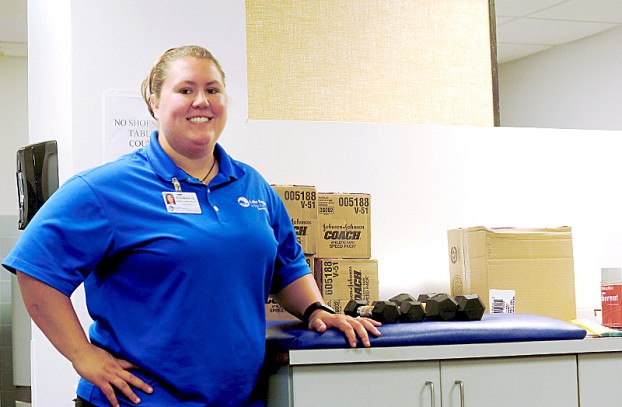
Article reposted from The Daily Journal
Author: Zach Stich
In stadiums, arenas, gyms and other sporting spots, the focus is generally on athletes and their coaches. But when an athlete sustains an injury, the game’s entertainment factor comes to a screeching halt. Fans’ eyes drift from the usual suspects toward that critical moment’s most important person — the athletic trainer.
In Fergus Falls and the surrounding community, Lake Region Healthcare athletic trainer Liz Ostrowski is the person athletes want to see running out to provide them immediate medical attention.
Originally from Wisconsin Rapids, Wisconsin, Ostrowksi earned her Bachelor of Science in athletic training from the University of Wisconsin-Stevens Point. An injury of her own sparked Ostrowski’s interest in the profession.
It was while recovering from a torn anterior cruciate ligament that Ostrowski befriended a young boy who had been born with a deformity. After many surgeries, he was learning to walk for the first time in his life.
“He wasn’t responding well to the physical therapist because he was scared, but he seemed to listen to me,” Ostrowski said.
She found herself helping the physical therapist get through to the boy.
“I watched him take his first steps ever,” she said. “That was the moment I knew I wanted to be in the medical field.”
It was the most rewarding feeling, she said, to see the joy in the boy’s face as he walked for the first time.
“His parents couldn’t express how happy they were that their son could now live a more normal life,” she said.
An athletic trainer’s day-to-day varies by season. Some days, Ostrowski works a normal, eight-hour shift. Other days, she’s on the grind 12-14 hours. Her time roaming the sidelines, sitting courtside and following up with athletes peaks during the school year, when she works six days a week at different events and practices.
Ostrowski said the biggest challenge her line of work presents isn’t dealing with injuries or the hours she spends on the job, but rather, balancing her schedule. Working with two schools and at the clinic has her “constantly on the go,” she said.
“When weather decides to mess up game schedules, I really need to work hard to try and fit in all the events I can for my schools,” Ostrowski said.
Despite the packed schedule, Ostrowski said she doesn’t discriminate among sports. Athletes in swimming and golf may be the easiest to work with because the sports tend to cause few injuries, she said, but each sport has its own positives and negatives. While football and hockey may be the most likely to cause severe injuries, Ostrowski said the constant action on the sports’ fields of play allows her to focus and dial in her job better, for example.
One of the most interesting encounters Ostrowski’s had in her profession was when a player suffered a concussion that caused 10-second memory. The player had been hit hard in the head before his skull bounced off the turf.
“When I got to him on the field and I made my assessment, I knew I had to get him to the hospital as soon as possible,” she said. “On the way there, I had to continually answer the question, “What happened?”
That lasted for the next few hours, she said, until eventually, something she said seemed to trigger a memory for the player, and more started to come back, too.
“Within 24 hours, he made a full recovery,” she said. “It was a very rare case. The brain is an amazing organ and never fails to surprise us.”
Though she’s a transplant from the state to the east, Ostrowski likes Fergus Falls and the people she works with.
When she isn’t working with high school and college athletes, Ostrowski spends her time on home renovation projects, riding bike, playing games with friends and traveling.